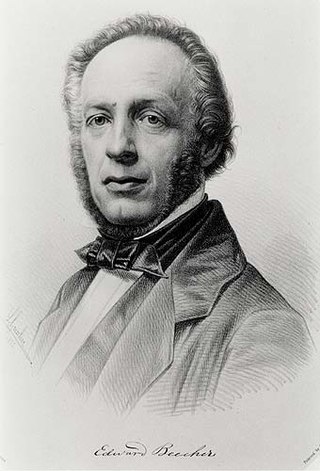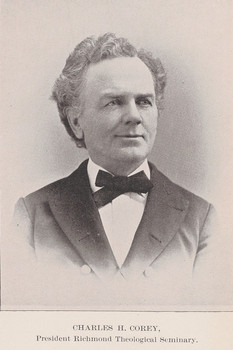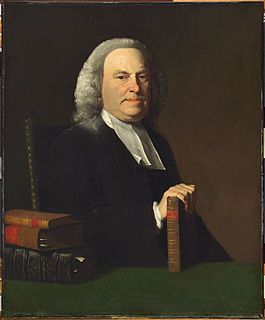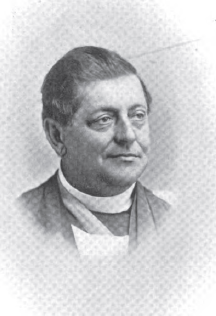Nathaniel Colver | |
|---|---|
 | |
| Born | 10 May 1794 Orwell |
| Died | 25 December 1870 Chicago |
Nathaniel Colver (born in Orwell, Vermont, 10 May 1794; died in Chicago, 25 December 1870) was an American Baptist clergyman.
Nathaniel Colver | |
|---|---|
 | |
| Born | 10 May 1794 Orwell |
| Died | 25 December 1870 Chicago |
Nathaniel Colver (born in Orwell, Vermont, 10 May 1794; died in Chicago, 25 December 1870) was an American Baptist clergyman.
Colver's father, a Baptist minister, moved, while Nathaniel was a child, to Champlain, in northern New York, and thence to West Stockbridge, Massachusetts, where the son was converted and decided to enter the Baptist ministry. Though he had but slender opportunities of early education, he made himself a respectable scholar. [1]
After brief pastorates in various places, Colver was called in 1839 to Boston, where he cooperated in organizing the church later known as Tremont Temple. His ministry there was remarkable for its bold, uncompromising, and effective warfare upon slavery and intemperance, as well as for its directly spiritual results. On leaving Boston in 1852, Colver was pastor at South Abington, Massachusetts, at Detroit, at Cincinnati, and finally, in 1861, at Chicago. While in Cincinnati, he received from Denison University the degree of D.D. In Chicago he held the inaugural professorship of doctrinal theology in the theological seminary which later became the Divinity School of the University of Chicago. [1]
From 1867 to 1870, Colver was president of the Freedman's Institute in Richmond, Virginia. Colver played a conspicuous role in the anti-masonic, anti-slavery, and temperance movements of his day. [1] In 1867, Colver headed the Richmond Campus of the National Theological Institute of Washington D.C., created by the American Baptist Home Mission Society. He died shortly thereafter and the school was renamed the Colver Institute in his honor. It eventually became part of Virginia Union University in 1899. [2]
Colver published, besides occasional addresses, three lectures on Odd-fellowship (1844). [1]

Lyman Beecher was a Presbyterian minister, and the father of 13 children, many of whom became noted figures, including Harriet Beecher Stowe, Henry Ward Beecher, Charles Beecher, Edward Beecher, Isabella Beecher Hooker, Catharine Beecher, and Thomas K. Beecher.

Theodore Dwight Weld was one of the architects of the American abolitionist movement during its formative years from 1830 to 1844, playing a role as writer, editor, speaker, and organizer. He is best known for his co-authorship of the authoritative compendium American Slavery As It Is: Testimony of a Thousand Witnesses, published in 1839. Harriet Beecher Stowe partly based Uncle Tom’s Cabin on Weld's text; the latter is regarded as second only to the former in its influence on the antislavery movement. Weld remained dedicated to the abolitionist movement until slavery was ended by the Thirteenth Amendment to the United States Constitution in 1865.

Virginia Union University is a private historically black Baptist university in Richmond, Virginia. It is affiliated with the American Baptist Churches USA.

Francis Wayland, was an American Baptist minister, educator and economist. He was president of Brown University and pastor of the First Baptist Church in America in Providence, Rhode Island. In Washington, D.C., Wayland Seminary was established in 1867, primarily to educate former slaves, and was named in his honor.

Reverend Nehemiah Adams was an American clergyman and writer.

Charles Beecher was an American minister, composer of religious hymns and a prolific author.

William Weston Patton, was an abolitionist, academic administrator, and scholar. He served as the fifth president of Howard University, and one of the contributors to the words of "John Brown's Body". He was the son of Rev. William Patton and the grandson of Anglo-Irish Congregationalist immigrant and Revolutionary War soldier Major Robert Patton.
Nathaniel Clark Burt was an American Presbyterian clergyman.

Edward Beecher D.D. was an American theologian, the son of Lyman Beecher and the brother of Harriet Beecher Stowe and Henry Ward Beecher.
Wayland Seminary was the Washington, D.C. school of the National Theological Institute. The institute was established beginning in 1865 by the American Baptist Home Mission Society (ABHMS). At first designed primarily for providing education and training for African-American freedmen to enter into the ministry, it expanded its offerings to meet the educational demands of the former enslaved population. Just before the end of the 19th century it was merged with its sister institution, the Richmond Theological Seminary, to form the current Virginia Union University in Richmond.

Calvin Ellis Stowe was an American Biblical scholar who helped spread public education in the United States. Over his career, he was a professor of languages and Biblical and sacred literature at Andover Theological Seminary, Dartmouth College, Lane Theological Seminary, and Bowdoin College. He was the husband and literary agent of Harriet Beecher Stowe, author of the best-seller Uncle Tom's Cabin.
Richmond Theological Seminary (RTS) was a higher education institution in Richmond, Virginia, serving former slaves after the American Civil War. It had its beginnings in November 1865 when the American Baptist Home Mission Society (ABHMS) sponsored Joseph Getchell Binney a short-lived class in Richmond, VA for theological training of African-Americans.

Charles Henry Corey (1834-1899), was a Canadian Baptist clergyman.

Lumpkin's Jail, also known as "the Devil's half acre", was a holding facility, or slave jail, located in Richmond, Virginia, just three blocks from the state capitol building. More than five dozen firms traded in enslaved human beings within blocks of Richmond's Wall Street between 14th and 18th Streets between the 1830s and the end of the American Civil War. Its final and most notorious owner, Robert Lumpkin, bought and sold slaves throughout the South for well over twenty years, and Lumpkin's Jail became Richmond's largest slave-holding facility.

Nathaniel Appleton was a Congregational minister in Cambridge, Massachusetts.

William Henry Odenheimer was the third Episcopal Bishop of New Jersey and the first of Northern New Jersey.
Lucius Edwin Smith was a United States lawyer, editor, clergyman and educator.

Henry Sweetser Burrage was a United States clergyman, editor and author.
Alexander White Pitzer (1834–1927) was an American Presbyterian clergyman. He was the author of several books on theology, and was a professor of biblical history and literature at Howard University.
James Robinson Boise was an American classicist. He was the author of several Greek text books.